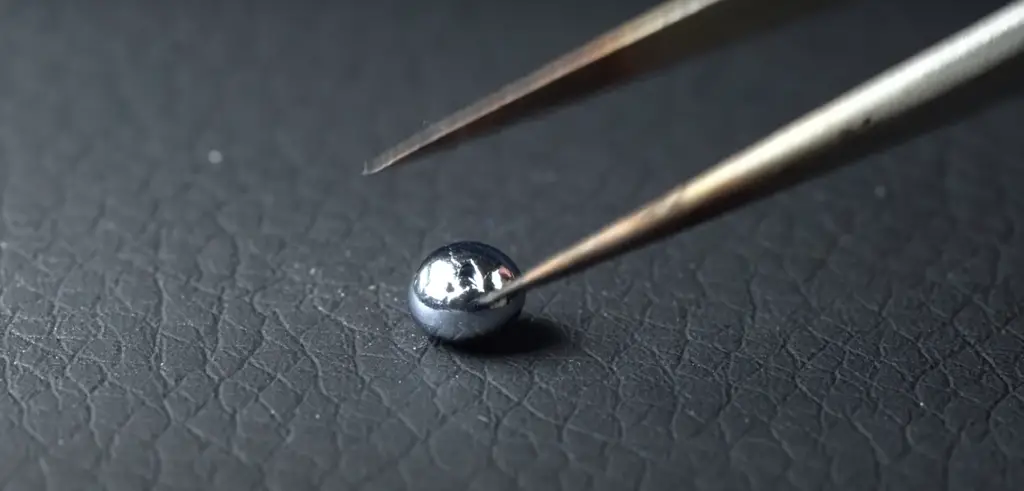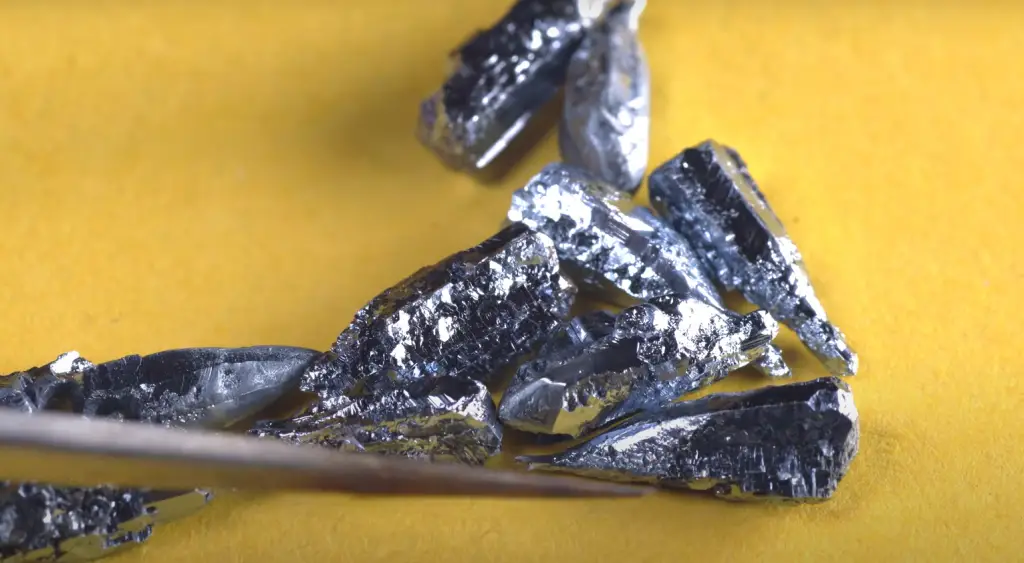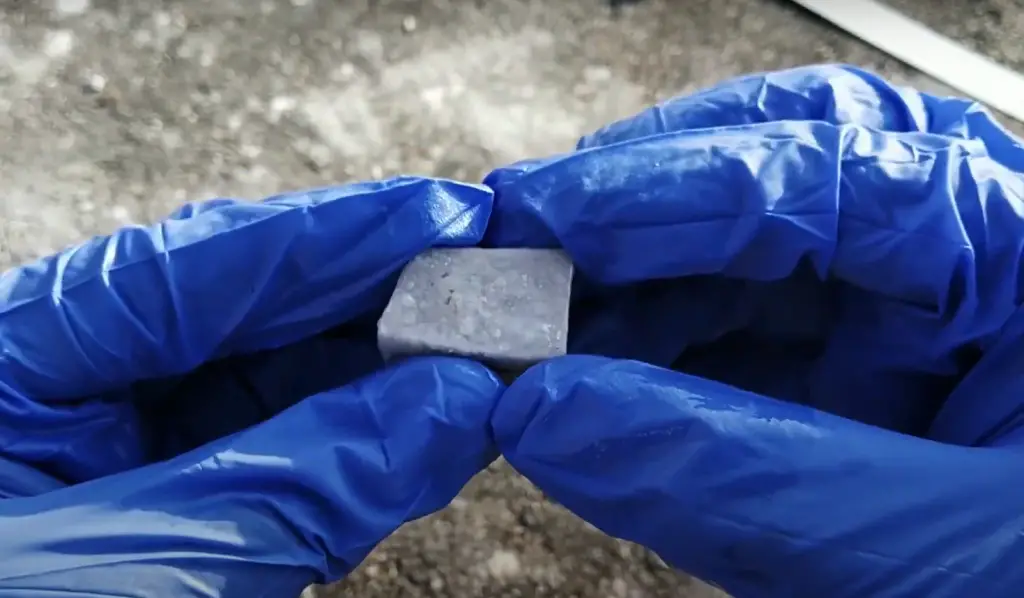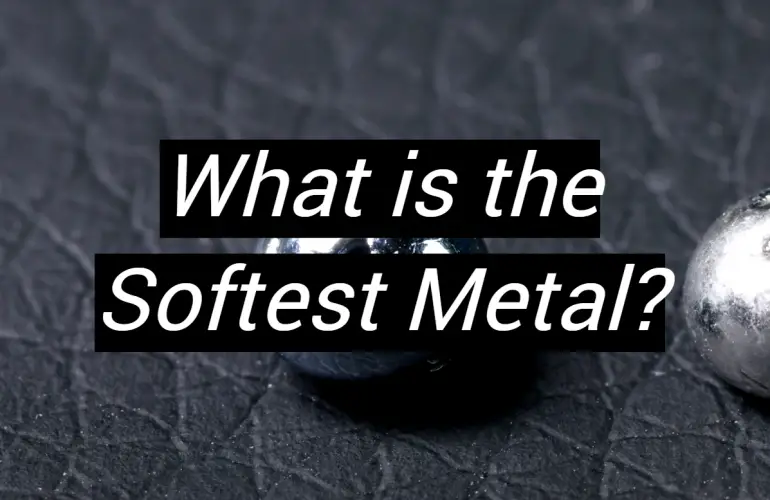There are many different types of metals in the world, each with its own unique properties. Some metals are harder than others, some are more flexible, and some are softer than others.
Why should you know about soft metals? Because they have a variety of uses, from being used in jewelry to being used in construction. Plus, they’re just really interesting!
So what is the softest metal? Surprisingly, there is no definitive answer to this question! Different sources list different metals as being the softest metal. In this blog post, we will explore the different contenders for this title and try to determine which one is truly the softest metal. Stay tuned to find out!
What Is Considered Soft Metal?
The word “soft” in terms of metals generally refers to the metal’s malleability. This is the ability of the metal to be hammered into thin sheets. Soft metals are also easily cut with a knife. Some examples of soft metals include gold, silver, lead, and copper.

Aluminum is considered a soft metal as well, although it is not as malleable as other soft metals.
The Mohs hardness scale rates the softness of various metals. The following are some of the softest metals: lead, gold, silver, tin, zinc, aluminum, thorium, copper, brass, and bronze.
Mercury is a liquid at room temperature [1].
The Softest Metals
Cesium
Cesium or caesium is a chemical element with the symbol Cs and atomic number 55. It is a soft, silvery-gold alkali metal with a melting point of 28.53 °C (83.13 °F). This makes it one of only five elemental metals that are liquid at or near room temperature. Cesium has physical and chemical properties similar to those of rubidium and potassium.
Cesium is considered the softest metal. It is so soft that it can be cut with a butter knife. Cesium is also one of the most reactive metals. It is so reactive that it will explode when it comes into contact with water. Cesium is used in atomic clocks, photoelectric cells, and glassmaking [2].
Cesium is a soft, gold-colored metal that is destroyed by air and generates violently in water. The most frequent application of cesium compounds is as a drilling fluid. They’re also utilized in super high-performance optical glass, as a catalyst promoter, in vacuum tubes, and in radiation monitoring equipment.
Although cesium is often considered the softest metal, there are other metals that are softer than cesium. These metals include sodium, potassium, rubidium, and Francium.
Lead
Lead is a heavy metal that is soft and malleable. Lead has a low melting point and is easily cut with a knife. Lead is used in batteries, ammunition, solder, and pipes. Lead is also used to make X-ray shields.
This metal’s symbol is Pb and its atomic number is 82. Its physical and chemical properties are very different from those of the other metals in its group. It is one of the most stable of all the metals [3].
While lead is very soft, it is also very poisonous. Lead exposure can cause damage to the brain and nervous system. Lead poisoning can be fatal.
Symptoms of lead poisoning include stomach pain, headaches, irritability, and fatigue.Mercury
While lead is soft, it’s not the softest metal. The honor of being the softest metal goes to another heavy metal: mercury. Mercury is a silvery-white metal that is liquid at room temperature. This metal is used in thermometers, barometers, and fluorescent light bulbs. The symbol for mercury is Hg and its atomic number is 80 [4].
Mercury is a very dangerous metal. It is poisonous and can cause serious health problems. Mercury exposure can damage the brain, kidneys, and lungs.
Symptoms of mercury poisoning include headaches, dizziness, nausea, and skin rashes.

So, what’s the difference between lead and mercury? Lead is softer than mercury because it has a lower Mohs hardness rating. Mercury also has a higher density than lead. This means that, while both metals are soft, mercury is slightly harder than lead. However, both metals are still considered to be soft metals.
Lithium
Lithium is the lightest metal on the periodic table. This silvery-white metal is soft and malleable. Lithium is used in batteries, alloys, and glass. The symbol for lithium is Li and its atomic number is three [5].
Lithium is a very reactive metal. It reacts with water and air to form lithium hydroxide and lithium oxide. These reactions can be dangerous, so it’s important to handle lithium with care.
Lithium is the softest metal on the periodic table. However, it’s not the only soft metal. Lead and mercury are also soft metals. All three of these metals are considered to be heavy metals. Heavy metals are poisonous and can cause serious health problems if they’re ingested or inhaled. So, while they may be soft, you should still handle them with care!
Aluminum
Aluminum is the most abundant metal in the Earth’s crust. It’s a silvery-white metal that is soft and malleable. Aluminum is used in cans, foil, and kitchen utensils. The symbol for aluminum is Al and its atomic number is 13 [6].
Aluminum is a very reactive metal. It reacts with oxygen to form aluminum oxide. This reaction is called oxidation. Oxidation can cause corrosion, which can weaken aluminum and make it brittle.

Aluminum is the third softest metal on the periodic table. It’s softer than lead and mercury, but it’s still considered to be heavy metal. Heavy metals are poisonous and can cause serious health problems if they’re ingested or inhaled.
These are the five softest metals on the periodic table. Lead, mercury, lithium, aluminum, and sodium are all considered to be soft metals. While they may be soft, they’re also dangerous.
So, what’s the difference between lithium and aluminum? While both metals are soft, lithium is softer than aluminum because it has a lower Mohs hardness rating. Lithium also has a lower density than aluminum. This means that, while both metals are soft, aluminum is slightly harder than lithium. However, both metals are still considered to be soft metals.
FAQ
What is the softest metal list?
The softest metals are lead, cesium, mercury, lithium, and aluminum. They all have a low Mohs hardness, which means they can be scratched easily.
The softest metal element is cesium. Cesium is also the most reactive of all the elements, so it must be stored in an airtight container to prevent it from oxidizing.
The softest metals used in jewelry are lead and tin. Lead is a very dense metal, so it’s often used in heavy-duty applications like X-ray shielding. Tin is a softer metal, so it’s often used in plating or coating other metals to give them a shiny finish.

There are other elements that are even softer than these metals, but they are not considered metals.
For example, graphite is one of the softest materials in the world with a Mohs hardness of just 0.05. However, it is not metal because it does not conduct electricity or heat very well.
Which is the softest and hardest metal?
The softest metal is cesium, which can be cut with a butter knife. It’s utilized in atomic clocks. Chromium is the hardest metal and scratch resistance is measured by how well it resists being scratched [7].
Which is softer – gold or lead?
Lead is softer. It may be scratched with your fingernail, and large pieces of lead can be easily bent into curves. This is not as simple as it sounds with gold. You can scratch gold with a knife, but you’ll need a chisel to scratch lead.
Keep in mind that the hardness of a metal can depend on its purity.
For example, 24-karat gold is softer than 14-karat gold because it contains more impurities. Hardness also varies depending on the direction of the grain in the metal [8].
How soft is pure gold?
Gold is so soft that one gram of it can be beaten into a sheet covering approximately a square meter. “Gilding” is the technique of applying gold leaf to an object.
A little bit of gold can be stretched into a very thin wire that is five kilometers long. In fact, one ounce of gold can be drawn into 40 miles (64 kilometers) of fine wire.
Gold is the only metal that doesn’t rust, corrode or tarnish. It also has a very low reactivity to other elements, which is why it is often used as a protective coating on other metals [9].
Is silver softer than gold?
Pure gold, also known as fine gold, is softer than pure silver but harder than tin. Its magnificent sheen and luster cannot be matched by any alloyed metal. Pure gold’s extreme ductility, malleability, and softness render it unsuitable for jewelry applications in most cases [10].
Can you bite on gold?
No, you can’t. Gold is a metal that is too soft to be used for teeth. In fact, it’s one of the softest metals in the world. That’s why it’s often used in jewelry and other decorative items. But what exactly makes gold so soft?
Gold is a very malleable metal. This means that it can be easily deformed without breaking. When gold is combined with other metals, it becomes even more malleable. This makes it ideal for use in things like coins and medals.
Despite its softness, gold is still a very valuable metal. It’s rare, durable, and has a beautiful color that many people find appealing. So don’t let its softness fool you. Gold is still a precious metal that’s worth a lot of money [11].
Which metal is cut with a knife?
The metals that can be cut with a knife and are soft enough to do so are sodium and potassium. These are also known as alkali metals. They are located on the left side of the periodic table. The next softest metals are lithium, calcium, and magnesium.
These are also found on the left side of the periodic table but in a different group than sodium and potassium. Alkaline earth metals make up this group.
What is the lightest metal on Earth?
Magnesium is the lightest structural metal, and it is abundant in the earth’s crust and seawater. It is also biodegradable and recyclable. Magnesium has a density of only one-seventh that of steel, making it the perfect metal for aircraft construction.
Magnesium is also the softest metal in the world. It can be easily cut with a knife and shaped into any form. Magnesium is often used in medical implants because it is non-toxic and does not cause an immune reaction [12].
Is titanium a light metal?
Titanium is a light metal with a density of only about 60% that of steel. It is strong, corrosion-resistant, and has a high melting point [13]. Titanium is often used in aircraft and spacecraft because of these properties.
While magnesium is the softest metal, titanium is one of the strongest. Titanium is also very resistant to corrosion and has a high melting point, making it perfect for use in aircraft or spacecraft.
However, titanium isn’t as abundant as magnesium and can be more expensive. If you’re looking for a strong yet lightweight metal, titanium may be a perfect choice.
Is aluminum a soft metal?
Durable and lightweight, aluminum is the metal of choice for most items. Commercial aluminum (99 to 99.6 percent pure) is hard and robust. Aluminum is ductile and very malleable, and it can be drawn into wire or rolled into thin foil. The metal has a density of about one-third that of iron or copper. It’s also non-magnetic and doesn’t conduct electricity well, which makes it ideal for electrical applications [14].
Is potassium a soft metal?
Potassium is a soft, silvery-white metal that is found in abundance in the earth’s crust [15]. The metal is very reactive and must be stored in mineral oil to prevent oxidation. Potassium is used in many commercial applications, including fertilizers, explosives, and pharmaceuticals.
While magnesium is the softest metal on Earth, potassium is one of the most abundant. Potassium is also very reactive and must be stored in mineral oil to prevent oxidation. However, potassium has many commercial uses, making it a versatile element. If you’re looking for a soft metal with many uses, potassium may be a good choice.
Useful Video: Osmium – The DENSEST Metal On Earth!
References:
- https://expandusceramicsquestions.com/qa/what-is-the-softest-metal.html
- https://en.wikipedia.org/wiki/Caesium
- https://en.wikipedia.org/wiki/Lead
- https://en.wikipedia.org/wiki/Mercury_(element)
- https://en.wikipedia.org/wiki/Lithium
- https://en.wikipedia.org/wiki/Aluminium
- https://brainly.in/question/624471
- https://www.funtrivia.com/askft/Question40298.html
- https://www.sciencefocus.com/science/why-is-gold-called-a-heavy-metal-despite-being-soft/
- https://www.hannonjewelers.com/metals2.html/
- https://www.cbs8.com/article/sports/olympics/olympic-winners-bite-medals/507-77d8b24f-101f-461d-851f-b228622496c9
- https://www.intlmag.org/page/mg-lightest-metal
- https://en.wikipedia.org/wiki/Titanium
- https://www.britannica.com/science/aluminum
- https://en.wikipedia.org/wiki/Potassium






